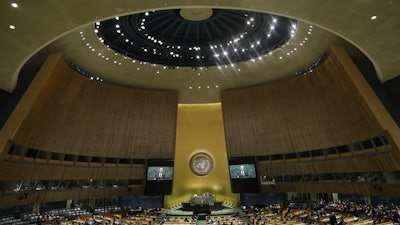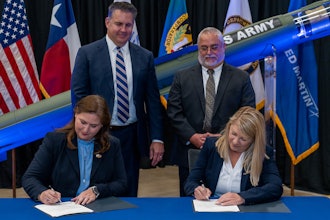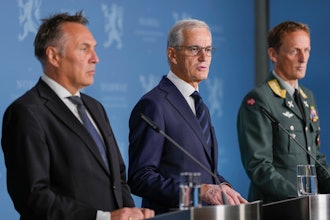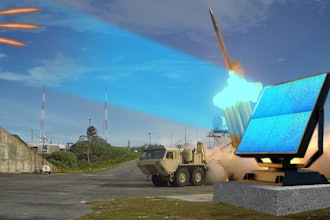
UNITED NATIONS (AP) — Nobel Peace laureate Jody Williams is helping lead a campaign for a new international treaty to ban killer weapons that can select targets and fire without decision-making by a human being.
Williams said at a news conference Monday that these lethal autonomous weapons "are crossing a moral and ethical Rubicon and should not be allowed to exist and be used in combat or in any other way."
The American peace activist said the Campaign to Stop Killer Robots, which started in 2013 and now has 130 groups in 60 countries supporting it, is trying to gain support from governments and people everywhere to step up pressure for a treaty, "so we don't see these weapons unleashed on the world."
Williams, who shared the 1997 Nobel Peace Prize for her key role in the successful campaign for a treaty banning land mines, came to New York with members of the killer robot campaign to meet with diplomats from the U.N. General Assembly's disarmament committee.
They brought a robot with them to the news conference and to a side event for U.N. member nations afterward that spoke out against killer robots.
"A machine is not a moral anything," Williams said. "So, allowing machines, in theory through algorithms, decide what they will target and what they will attack is one of the huge reasons why we consider to be crossing the Rubicon, and grossly unethical and immoral."
"Machines should be in the service of human beings," she said. "Human beings should not be in the service of machines."
Liz O'Sullivan, who resigned from the artificial intelligence company Clarifai Inc. over a project that could be used to build autonomous weapons and is now technical director of the Surveillance Technology Oversight Project, said she is devoting her life to prevent killer robots.
"There is absolutely nothing stopping a nation or any group of people from creating their own version of fully autonomous weapon systems today," she said. "They wouldn't work very well. They might not be safe, but they certainly do exist."
O'Sullivan said it seems every branch of the military is working on their own version of these weapons.
"There are autonomous boats that will potentially have the ability to fire, there are autonomous drones ... and also vehicles," she said. "The easiest technological problem to solve is through the drones, so that's most likely what we'll see first, and the rest as technology advances."
O'Sullivan said that is what is known just from public information and that there are almost certainly classified programs.
"These killer robots ... aren't a future problem," she said. "They're possible today, and they're something that we need to work to control right now."
Mary Wareham, advocacy director of Human Rights Watch's arms division and coordinator of the Campaign to Stop Killer Robots, said, "It is abundantly clear that we are moving very swiftly in the direction of fully autonomous weapons, which is why we're calling for diplomacy to speed up."
In mid-November the parties to the Convention on Conventional Weapons will be meeting in Geneva and they could agree to start such negotiations.
But Wareham said that committee operates by consensus and while "the vast majority of countries want to move forward," they are being held back by nations countries most advanced in developing autonomous weapons.
She said the United States has led in developing these weapons, followed by Russia and China, but other countries are also "heavily invested," including South Korea, Israel, the United Kingdom "to some extent" and perhaps Turkey and Iran.
She added that there are two other ways to launch negotiations — either by adopting a U.N. General Assembly resolution or having a country begin the process, as Canada did for the land mine treaty and Norway did for the treaty banning cluster munitions.
"Countries need to come together in a core group willing to take on the big guys, so to speak," Williams said.






















